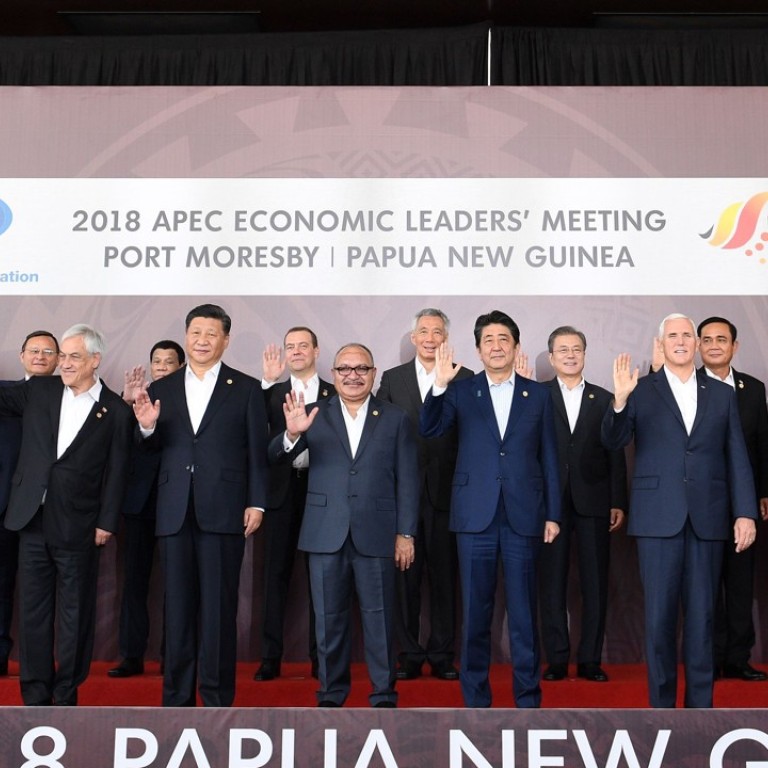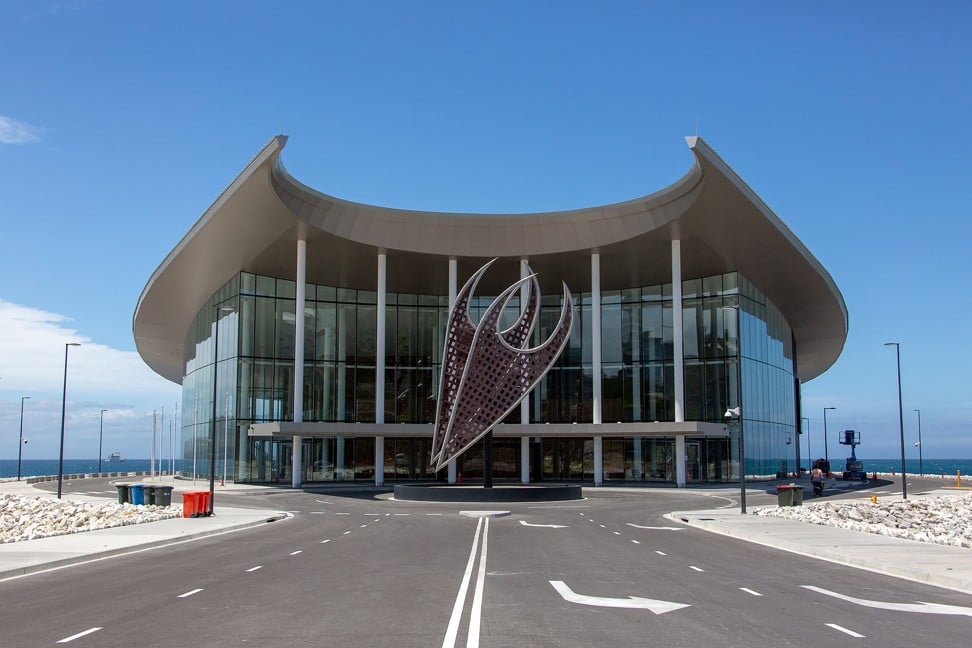
Global commerce is messy, so the moral high ground is for none to claim in pursuing free trade
- The US is not wrong to complain about China’s connivances to keep powerful foreign business forces from winning too much local business
- But it is wrong to claim unique honour and innocence at home. Trump’s team needs to “clean the mirror” before claiming higher moral ground
Over the past week in Papua New Guinea at the annual talkfest of the Asia-Pacific Economic Cooperation (Apec) forum, the region’s leaders have talked in unison of the need for free and open trade against the backdrop of ongoing trade conflict between the United States and China.
The US Vice President Mike Pence added fairness and reciprocity, attacking China for unfair trade practices ranging from quotas, forced technology transfer, intellectual property theft and industrial subsidies “on an unprecedented scale”.
For China, Xi Jinping praised the openness and cooperation that has underpinned rising prosperity and economic vitality across the region, attacking protection ad unilateralism, and calling for responsible and rules-based trade liberalisation.
China’s president also called on everyone to “clean the mirror before looking at ourselves”, or commenting on others – an important reminder of the rank hypocrisy of condemning pesky, corrupt and conniving foreign companies that allegedly undermine the honourable and socially supportive efforts of each country’s own resolute, plucky and always honest companies.

The reality is that in spite of decades of steady efforts worldwide, through the World Trade Organisation and in bilateral trade agreements, to eliminate trade barriers and enable foreign investment, the world of international trade remains a terribly messy place.
Border barriers to trade may have fallen, but behind-the-border obstacles remain alive and well. Headline market-opening initiatives are still nullified by regulations and licensing arrangements that protect local companies and keep those pesky foreigners at bay.
The US is not wrong to complain about China’s connivances to keep powerful foreign business forces from winning too much local business. But it is wrong to suggest that China is in any way alone. And it is wrong to claim unique honour and innocence at home. Trump’s team needs to “clean the mirror” before claiming higher moral ground.
There is nothing “unprecedented” about intellectual property theft. Indeed, US companies thieved ruthlessly in the country’s early development days.
There is nothing unprecedented about efforts to force technology transfer, or to subsidise or otherwise support our plucky local players, or to use quotas to limit foreign encroachment into our local economies, or to develop industrial policies.
China’s practices are being attacked not because they are “unprecedented”, but because China’s market has become important, some of its companies have become powerful, while access to China’s market has begun to influence the future prospects of major companies around the world.
Glimpse at barriers around India’s market, for example, or around Vietnam’s, and China is a liberal icon by comparison. India and Vietnam are not being vilified only because their domestic markets don’t matter that much, and their local companies are not nipping at the heels of the West’s leading multinationals.
As the US attacks the role of state-owned enterprises in China – for good reason, because they do retain competitive advantages that make certain sectors of the Chinese economy impermeable to competition – it forgets the surreptitious role of its own governments at both federal and state level in cosseting local companies, and keeping foreign competitors at bay.
Take the opaque world of government procurement. I first bumped into this invisible world back in the 1980s when a row erupted over contracts to supply pencils to Germany’s school system.
Germany insisted these contracts were open to competition from all comers. What it did not note is that the contract specifications for the pencils – including the size of the eraser attached to the end – happened to match uniquely the pencils made by a particular German manufacturer.
China, Turkey, Vietnam and Bangladesh may be formidably competitive manufacturers of all kinds of garments, but the US military still relies on US companies to supply it with the US$1 billion of uniforms it buys every year.
Such unnoticed business deals might seem idiosyncratic and inconsequential, but they are not. They amount worldwide to contracts worth many trillions of dollars, and they are used – often unashamedly – to favour local companies.
According to Eurostat and the Organisation of Economic Cooperation and Development (OECD), the US government’s procurement market stands at 9.3 per cent of GDP – which amounts to around US$1.8 trillion. Japan’s amounts to 16.3 per cent of GDP, or around US$789 billion.
By comparison, China’s government procurement business amounts to 3.9 per cent of GDP – still a hefty US$638 billion, but modest in global terms. And for the record, Hong Kong’s government procurement contracts amount to a measly US$10 billion a year – mostly focused on the construction sector.
Under the terms of the WTO’s Government Procurement Agreement, which includes 46 economies worldwide, with 32 observers, the US commits to improved transparency and contestability on procurement contracts at a national level, but then uses state-level “Buy America” legislation to block foreign companies from competing for state-level contracts.
The OECD says that 64 per cent of all US procurement contracts are state-level contracts. As I already noted, trade is a messy world, and those who would claim high moral ground should first “clean the mirror”.
Interestingly, controversy is raging in the US over a massive contract to supply the government with cloud computing services. Controversy focuses on the advantaged position of just one company – Amazon Web Services. Protests come from Microsoft and Oracle, who are keen to contest.
Needless to say, neither Huawei nor any other foreign cloud computing services provider need bother to apply, no matter what the quality of their technology.
For the record, and obviously, China is no paragon in the world of government procurement, and is still only in the process of acceding to the WTO’s Procurement Agreement. It nowadays has developed a fairly comprehensive website flagging upcoming procurement contract opportunities but the site is only in Chinese, so is not open to most international bidders.
This glimpse into the still highly protected world of procurement is but one example of how far we still need to go before we truly reach a world of “free and open trade and investment”.
The 1994 Uruguay Round of trade liberalisation agreement was important, but it was part of a work in progress that was preceded by seven other rounds that began in 1945. The disappointment today is not that China is in some unique way breaking the rules, but that the multilateral trade liberalisation process aimed at making global commerce less messy has stalled.
The answer is not Trump’s dog-eat-dog unilateralism, but renewed commitment to kick start the moribund WTO. And it would help if our major trading powers cleaned their mirrors before engaging.
David Dodwell researches and writes about global, regional and Hong Kong challenges from a Hong Kong point of view

